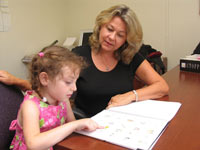Ready for school? Good readers formed before first day of kindergarten, UF study
Source:
Anne Bishop, Assistant Scholar
University of Florida College of Education
352-392-070 , ext. 280
GAINESVILLE, Fla. — So you’ve bought your child a lunchbox, a backpack, new shoes and hand soap for the teacher’s closet – but did you remember to give your kindergartener the literacy skills he or she needs to begin school?
Teachers often say they can tell, as early as kindergarten, which students are likely bound for college and which are headed for a 12-year struggle to finish school. A longitudinal study by University of Florida researchers has found evidence to support that claim.

University of Florida researcher Anne Bishop tests the “pre-literacy” skills of 5-year-old Camille Eyman, a few days before Camille’s first day of kindergarten.
“There are certain simple skills, such as letter recognition and the awareness of the sound structure of our language, that serve as very good predictors of a child’s reading success five years from now,” said Anne Bishop, an assistant scholar in special education at UF’s College of Education. “Without early intervention, a child who lacks these skills in kindergarten may have a hard time catching up.”
Bishop and her colleague, UF Assistant Scholar Martha League, have conducted a long-term study in which they tested children for various reading-related abilities in kindergarten, then followed up on their performance in reading through the fourth grade.
They tested the validity of a number of measures used to screen children for reading deficiencies. They determined that screening measures related to letter identification, phonological awareness and rapid naming of familiar objects predicted students’ ability to read fluently as they progressed in elementary school. They also determined it was just as advantageous to test children early in their kindergarten year instead of the middle of the year. The earlier students can be tested for learning deficiencies, Bishop said, the sooner they can receive the help they need. “We didn’t look beyond the fourth grade, but it is clear that a lack of good reading skills can have a cumulative effect,” Bishop said. “Past research studies have revealed that it is far more difficult to help children catch up beyond the elementary years. In fact, the success rate for helping children in the early grades is as high as 82 percent. After fifth grade it drops to 10 to 15 percent.” According to Bishop and League, critical skills for kindergarten-age children include:
- Recognizing letters: Learning the ABCs is the task most people associate with a young child’s education – and with good reason. Bishop and League found a strong correlation between the ability to name the letters of the alphabet in kindergarten and later performance in elementary school.
- Word play with sounds: A child should have an appreciation of the sound structure of our language, which is called phonological awareness. This involves playing games such as rhyming, clapping out the syllables in their names, taking apart simple compound words (understanding, for instance, that “starfish” is made of two words, “star” and “fish”) and being able to assemble new compound words. At a more complex level, kindergarten students should be able to recognize that words are composed of separate, distinct sounds – and should be able to count the different sounds in a simple word like “cat.” The child does not have to be able to read to develop these phonological skills as this word play is done without seeing the words, just working on the word parts or individual sounds.
While some students struggle with reading because of cognitive-based learning disabilities, Bishop said, a lag in these critical skills is more commonly due to a lack of early exposure to print and language development. Parents should never underestimate the power of reading to their children.
If your child’s screening determines that he or she is behind in any of these skills, the researchers say, that doesn’t mean he or she is doomed to academic failure. Intensive, early intervention can address problems before a student hits first grade, Bishop said, but that intervention must start as soon as possible. Among children who are failing to read by the end of the first grade, Bishop said, fewer than one in eight will ever catch up to grade level.
Bishop said parents can try a few simple techniques at home to give preschoolers and kindergarteners the skills they need to succeed in reading. Among her suggestions:
- Read to your kids: Children learn more than letters and sounds when you read to them. They learn that letters form words, that words are read from left to right, and that pages are read in a certain order. These “concepts of print,” as educators call them, are vital to future reading success.
- Play word games with your children: Ask your child, for instance, how to say “cupcake” without saying “cup” or without the “c” sound. This encourages them to think about the relationship of sounds in language.
- Build vocabulary – adventurously: Expose your child to as many different sights, experiences and concepts as you can, and teach the names for all of them. Reading aloud to your children greatly enhances their vocabulary.
- Talk to, not at, your child: When exploring a new place or concept, don’t simply tell your child what you know. Engage the child in conversation. Ask questions. Give your child the chance to use language.
For more tips on how to teach reading skills to your preschooler, Bishop suggests the book “Starting Out Right,” published by the National Research Council. For more in-depth information on teaching your child to read, go to the Florida Center for Reading Research website at: http://www.fcrr.org/curriculu m/curriculumForParents.htm.
By: Tim Lockette, (352) 392-0726 ext. 274; lockette@coe.ufl.edu




